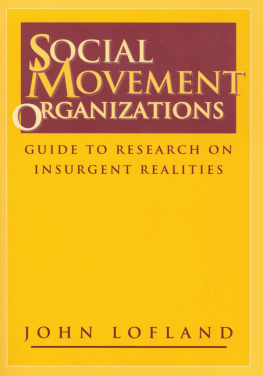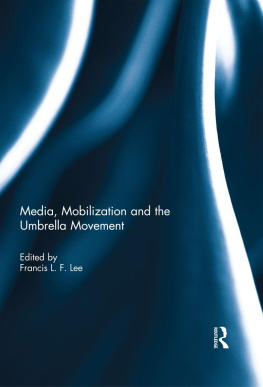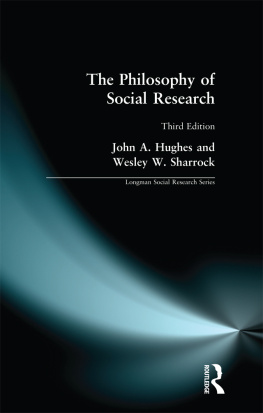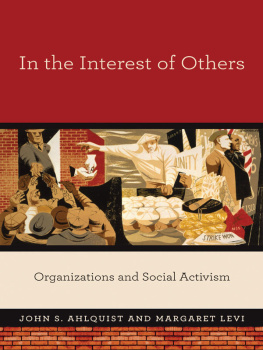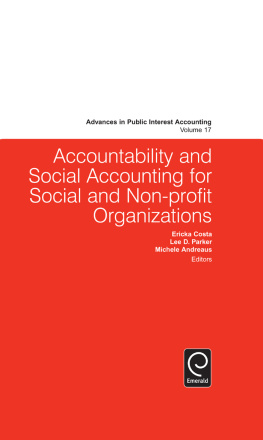First published 1996 by Transaction Publishers
Published 2017 by Routledge
2 Park Square, Milton Park, Abingdon, Oxon OX14 4RN
711 Third Avenue, New York, NY 10017, USA
Routledge is an imprint of the Taylor & Francis Group, an informa business
Copyright 1996 by Taylor & Francis.
All rights reserved. No part of this book may be reprinted or reproduced or utilised in any form or by any electronic, mechanical, or other means, now known or hereafter invented, including photocopying and recording, or in any information storage or retrieval system, without permission in writing from the publishers.
Notice:
Product or corporate names may be trademarks or registered trademarks, and are used only for identification and explanation without intent to infringe.
Library of Congress Catalog Number: 2007049688
Library of Congress Cataloging-in-Publication Data
Lofland, John.
Social movement organizations: guide to research on insurgent realities / John Lofland.
p. cm.(Social problems and social issues)
Includes bibliographical references and index.
ISBN 978-0-202-30553-0 (pbk.: alk. paper).
1. Social movementsResearch. 2. Social movements. I. Title.
HN29.L631996
303.48'4dc20
2007049688
CIP
ISBN 13: 978-0-202-30553-0 (pbk)
The reality; espoused in the mainstream of a society is but one reality: a privileged reality that excludes or represses many others. Rejecting their exclusion or repression, the insurgent realities of social movement organizations challenge mainstream reality and seek to establish new and better ways of life.
In this guide, I explain (1) how social scientists go about studying social movement organizationstheir research proceduresand (2) what investigators have learned about these insurgent realities in the form of generalizations or propositions that answer key questions.
As a handbook or manual on social movement organizations (or SMOs, in researcher jargon), I hope this volume is of interest to people with the following (among other) concerns.
First, in featuring discussions of research procedures, people seeking to analyze social movements more generally and SMOs in particular will hopefully be helped by my reports on sources, methods, and other aspects of inquiry. Even though people doing research are an important audience, I must nonetheless distinguish between this book as a guide to research and books that are narrowly and only guides to how to do research. This latter type of volume provides much more detailed step-by-step instructions than I offer here. In contrast, in this volume' I describe sources and types of data and one type of research process, but my central focus is on the products of research rather than on its detailed process. This is, instead, a guide to research rather than only a manual on how to do; research. (Researchers seeking more detailed how-to-do-it instructions can consult the specialized manuals of instruction I recommend in .)
Second, people enrolled in college courses on social movements, social change, political sociology, and related subjects will find the ideas I recount of interest as they relate to these and other broad topics. In particular, in focusing on organizations and people acting in them, one can come to see that social movements and social change do not merely happen.; Instead, they are constructed by people in struggle. Whatever one's seemingly settled world, it is only the temporary congealment of historical strife.
Third, although this guide is substantively about SMOs, it is also about one special type of research procedure, the kind employing a case study; and grounded theory; approach to the development of social knowledge. While this volume is not a substitute for manuals of instructions on such research, I do explain how the approach is applied to SMOs. Instructors of courses on research methods who want to introduce case-study-grounded theory in a more topically focused way might therefore find this a useful vehicle.
Fourth and more broadly, my stress on inquiry as constituted by asking and answering eight generic questions provides an intellectual tool kit that anyone can use to good effect in analyzing virtually any topic. As such, this question-answer tool kit can be helpful in a variety of instructional contexts, especially in the teaching the logic of theory and theory construction.
Fifth, although framed as the analysis of research process and propositions, what I do here also importantly reacts to what I think is the excessive narrowness of movement studies in recent years. I am therefore trying to break out of current straitjacketing foci and to envision larger horizons. Because of this, older hands in the study of movements might find my expansionist forays of interest. (The vistas I espy, though, are in good measure a resurrection of the range of topics that have been of interest to movement scholars historically, but that have been in virtual eclipse of late.)
Sixth, this guide is analytic; rather than activist; in character, but I hope that, even so, social movement activists and other movement participants can profit from it. In my effort to expand the research agenda of movement studies, I also discuss many questions that are of specific concern to activists. While this guide is not a nuts-and-bolts treatment in the tradition of movement how-to-do-it manuals (a genre described in ), much of what I report is quite pertinent to how-to-do-it concerns. Specifically, the many aspects of SMOs I treat can be read as a checklist of problem areas in the functioning and strategizing of any SMO. Seriously going through that checklist and assessing an SMO's position on each of them can serve to clarify its location in social space. I describe several possible positions and postures on many of these aspects and this knowledge of other possibilities can then serve to clarify a specific SMO's particular problems and options.
Seventh and most fundamentally, this is a book about morality that should be of interest to people seeking to sharpen their ethical awareness. As challenges to whatever is a current mainstream reality, SMOs question the morality of that reality. While I do not lay out the pros and cons of one or another moral claim, in reporting the generic claims and actions of SMOs, I of necessity canvas many dimensions of answers to the root question, How should life be lived? A reader attuned to philosophical/existential issues can, indeed, use this book as a guide to many of the most profound decisions facing a person who is trying thoughtfully to develop a reasoned, moral life.
* * *
As a guide to researchand therefore a compendium of itmy widest debt in writing this volume is to all the researchers who have, in fact, created this book's content. I therefore acknowledge the help of every person named in the list of references. In one way or another, every one of them has helped.
This book was initially conceived as a very brief primer that John D. McCarthy and I were going to write together. That plan was not realized, but throughout the writing of this different book, John has been a critically important confidant, sounding board, and source of support most especially in repeatedly expressing his belief in the importance of an effort of this kind.
The following colleagues read various portions and drafts of the materials and I am grateful for their efforts and suggestions, many of which have led to significant revisions: Mitch Allen, Rob Benford, Joel Best, Hank Johnston, Lyn H. Lofland, John McCarthy, Sam Marullo, James Richardson, David Snow, Mayer Zald, and several anonymous reviewers for publishers (with special thanks to Claude Tweeles and Christine Worden).

